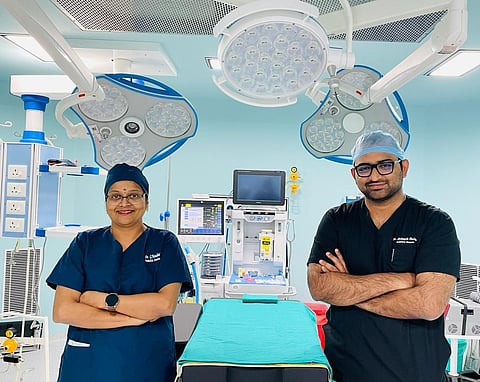Why we need paediatric surgeons
Children need tender loving care in all aspects, especially when they are sick. They can’t communicate their symptoms, answer any medical queries, and may not be patient enough to cooperate for a clinical examination. Children form a special category to deal with, in both medical or surgical fields.
Paediatric surgery is a distinctive surgical super specialty provided by highly skilled surgeons formally trained in basic general surgery and further trained in paediatric surgery and urology with intricacies of treating smaller kids – from antenatal period to adolescence – who have unique surgical needs.
As the adult spectrum of surgical diseases are commonly predictable to operate, they are handled by organ-specific specialists like urology handling urinary system, gastroenterology handling bowel, hepatobiliary handling liver, and so on. But since children are a unique set of patients, paediatric surgeons are trained in all the general surgical needs of the child from the womb to the adolescent stage, keeping in mind the special needs during the child’s growth and development. Newborn surgical concepts are different from the adolescent surgical needs of a child.
Paediatric surgeons are an amazing blend of paediatrician and general surgeon who operate with finesse on growing tissues. The growing anatomy of foetus to infant, the physiology of newborns vs adolescents, the two vital growth spurts in children (infancy and puberty), the individual timeline for development of various organs such as the kidney, liver, lung, brain, etc. create a different spectrum of surgical diseases in children.
Paediatric surgeons have to handle the entire gamut of surgeries with the specific needs of the different stages – foetus, newborn, infant, child, young adult, adolescent. They cater to the entire range of organs except cardiac, neurosurgery, and orthopaedics. Paediatric surgeons use special smaller equipment and facilities specifically designed for children.
In the last 50-60 years paediatric surgery has evolved into a speciality with the expertise to care for the tender growing tissues in children. The diagnosis and surgery on the child are done with utmost care supported by advanced imaging.
With the advent of newer inhalational anaesthetics, regional analgesia, small laryngeal mask airways, single lung ventilation with bronchial blockers, high-end aids like video/flexible bronchoscopy, paediatric anaesthesia has scaled greater heights. It is possible to provide safe supportive anaesthesia for any child or newborn with difficult airway/syndromic children with almost nil mortality.
The robust supportive care provided by the neonatal intensivist and paediatric intensivist for complex surgical procedures forms the backbone of the postoperative care in attending to the altered physiology postoperatively, avoiding hypothermia and fluid challenges. This has improved the survival rate in children from 30% to 98% in this era.
The true challenges in paediatric surgery and urology were the miniature instruments, which has now been upscaled to cater to even 1 kg preterm babies. It is now possible for a 700 gm preterm to undergo anaesthesia and surgery safely and grow into a normal adult.
Paediatric surgeons diagnose, treat, and manage children’s surgical needs including:
Prenatal counselling for mothers whose babies have been diagnosed with certain birth defects during pregnancy
Newborn defects such as bowel atresia, anorectal malformation, aganglionosis, etc.
Surgical repair of birth defects, including but not limited to oesophagus, lungs, intestinal tract, abdominal wall defects, and diaphragm defects
Surgery for abnormalities in growth including undescended testes, hernia, and hydroceles
Urgent and emergent operations of infective origin, such as acute scrotum, appendectomy
Surgical and non-operative management of major/minor trauma. These can include burns, liver lacerations, knife wounds or gunshot wounds.
Diagnosis and surgical care of cancers, including removal of tumors from the chest, abdomen, skin/fat, testicles and ovaries
Endocrine surgeries – thyroid / ovarian cyst / adrenal masses
Hepatobiliary surgeries
Paediatric urology – PUJ obstruction, reflux, post urethral valve, etc
Paediatric thoracic surgeries
Paediatric endourology surgeries, including renal stones
Minimally invasive surgeries in thorax/abdomen and urology
These tender, skillful specialists can be compared to watch repairers who have to be gentle in their work to ensure the watch/clock runs smoothly for years. To conclude, why do we need paediatric surgeons – because children are not little adults.
This article is curated to commemorate the introduction of World Paediatric Surgery Day celebrated on April 7 every year by WOFAPS (The World Federation of Associations of Pediatric Surgeons) and to create awareness about the need for paediatric surgeons. Every year December 29 is celebrated as National Paediatric Surgery Day in India to highlight the role played by paediatric surgeons in maintaining the health and wellness of children.

